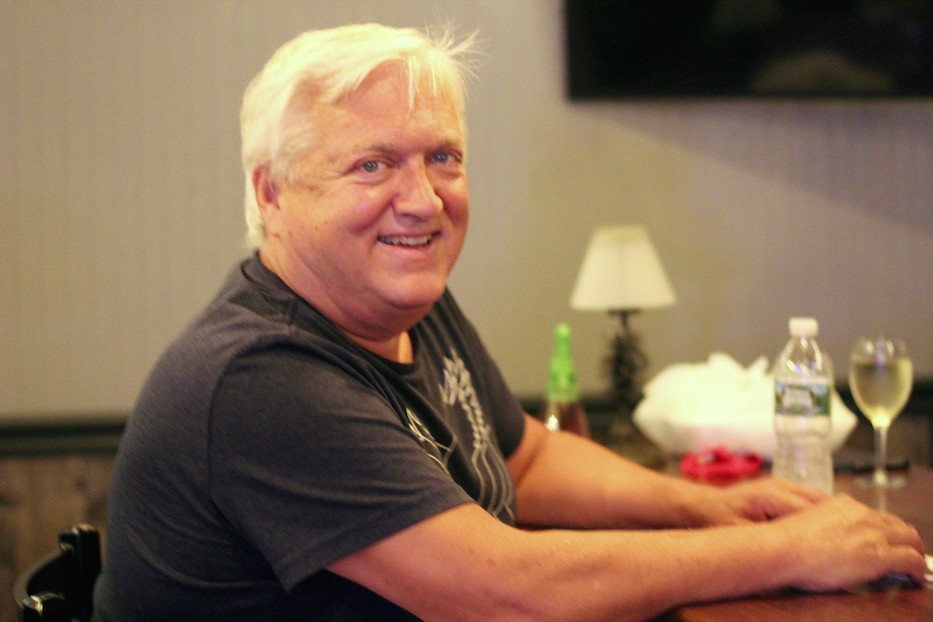
Culture & Community | Downtown | LGBTQ | Arts & Culture | COVID-19
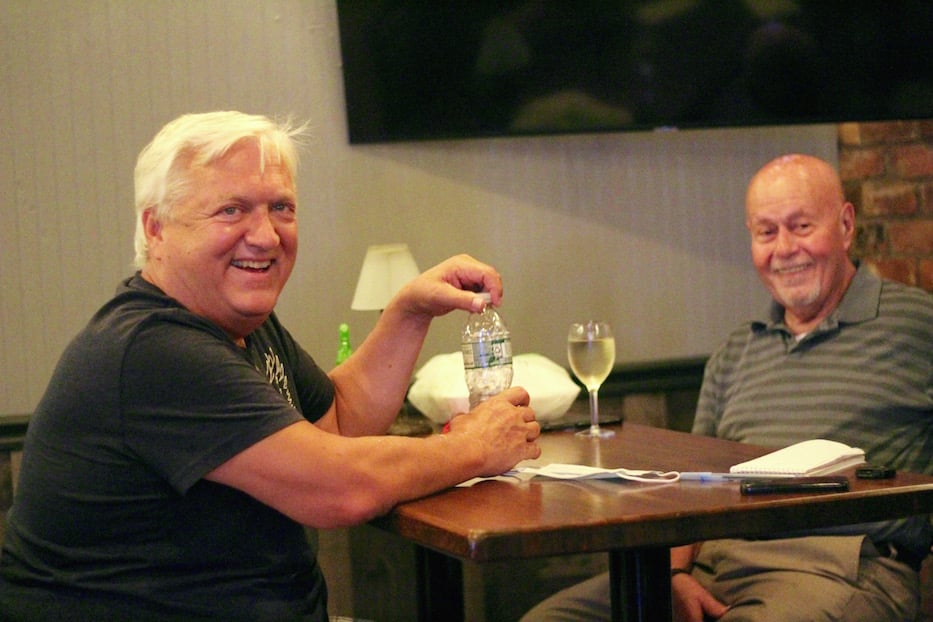
| Joey Goodwin: “I didn’t sell to Yale to surrender. I sold to Yale because I think they’re good for the City of New Haven.” Lucy Gellman Photos. |
168 York Street Cafe survived a fire, a move, multiple owners and a name change. It survived the AIDS crisis. It lived to see the end of disco and the beginning of drag in New Haven. Now, even though its longtime owner has sold the building to Yale University, the beloved neighborhood bar once nicknamed “The Gay Cheers” still isn’t going anywhere.
Joseph "Joey" Goodwin drove that message home on a recent evening at 168 York Street Cafe, as he spoke about the history, legacy and future of New England’s longest-running gay bar and the building in which it is located. After 28 years as owner, Goodwin and his business partner Mary Tirozzi sold the building to Yale University for $2.85 million last week. The building is also home to Salon J and a number of apartments.
“When I bought the building, I knew that I was going to sell it,” he said in an interview at the bar, as plates of salads, piping hot wings, burgers, and salt-dusted fries came out from the kitchen. “That was my plan. I’m a real estate agent. Yale’s been looking at this building forever, and I knew that. Deep down inside, I knew that I didn’t want to be a landlord anymore. I said, ‘you know what? This is a godsend.’”
“I didn’t sell to Yale to surrender,” he later added. “I sold to Yale because I think they’re good for the City of New Haven.”

Yale spokesperson Karen Peart did not respond to multiple requests for comment. Goodwin declined to comment on the terms of his lease, but said that “I can tell you I’m not going anywhere for quite a long time.” The spot, which has a dining room, bar, and full menu, has recently reopened after months of COVID-19 closures.
He has run the bar with the co-ownership of his longtime partner George Coyle, who has worked at some version of the spot since 1971.
Goodwin’s relationship with 168 York began long before it was officially 168 York, and before he had snagged its long-running title (that belonged to Westport’s Brook Cafe until 2010, when it closed after 71 years in business). Born and raised in New Haven, Goodwin grew up in the 1970s, first in Wooster Square and then in the city’s Annex neighborhood. As a teenager at Richard C. Lee High School, he became part of city history as he participated in attempts to desegregate through bussing.
He also spent those years trying to find his people. In 1976, he started going to what was then called The Pub Cafe at its original location on Chapel Street, where Book Trader now stands. He was underage and starry-eyed; the place became a sort of home base. When The Pub burned down in 1978, he watched as owners Jimmy Bombard and Jerry Carlson moved down the block to 168 York St., and started to rebuild.
Before they moved in, the space had been a biker bar called Inside Out. Keith Hyatte, who worked as a cook at The Pub, recalled it as dirty and “just creepy.” Then it transformed.
“The gay boys took it over and it became the neighborhood bar,” laughed his husband John Allen, who co-founded the New Haven Pride Center in 1996. “Everybody went. The local people and the students. It’s such a wonderful part of New Haven’s history.”
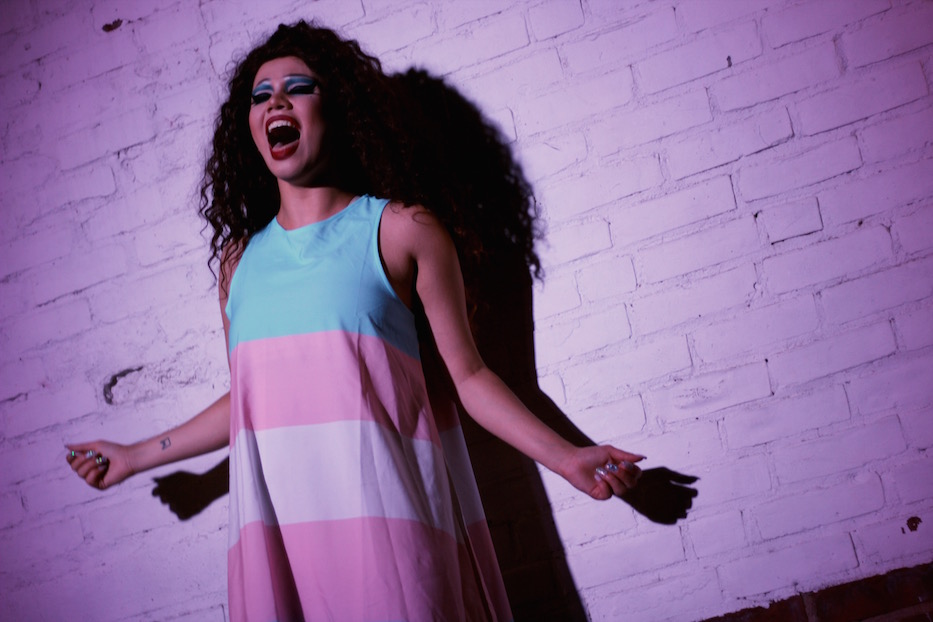
| Drag queen Rory Roux Lay Heart, who came out as a trans man at Dragapalooza in July 2019. Lucy Gellman File Photo. |
Around Goodwin, New Haven’s gay scene was slowly, cautiously expanding. On Crown Street, Jack Garity opened Partners Cafe in 1974, in the spot where it is still operated by Dave and Bernard Kleman. Gotham Citi Cafe, which Robb Bartolomeo opened in 1996, would not come for over another decade. The Pub held down its spot as the local watering hole.
Richard Tortora, a former Pub employee and longtime friend of Goodwin’s, recalled bringing his son there in the early 1980s, when both he and many of his friends were largely closeted. Decades later, he still returns to the space for pub food and glasses of chilled white wine.
“I was brought up hearing that I needed to meet a girl and get married,” he recalled during an interview at 168 York, as he ordered wing dings with a side of teriyaki. The wine sloshed in his glass as he spoke. “And what did I do? I met a girl and got married.”
Goodwin began working for Bombard and Carlson in 1985. At the time, he was still working a job selling concessions and managing the box office at the New Haven Coliseum, as groups including Iron Maiden, Deep Purple, Twisted Sister and Mötley Crüe made their way through town. When he wasn’t there, he was at The Pub. He saw how a gay bar could become the wildly beating heart of a community.
“Back then, this was the only gay bar to go to,” he recalled. “We migrated towards here.”
In 1992, Bombard decided to sell the building, and Goodwin bought it. When 168 York opened on Christmas Day in 1993, patrons dubbed it “The Gay Cheers.” The name stuck: 168 became a spot for first (and second, and third) dates, pre- and post-theater drinks, and meetings between new friends and old ones.
Goodwin loved being at the center of the action; he still does. After most work days as a real estate agent, he rolls into the bar around 6 p.m. and stays for hours.
“The economy was booming,” he said of the bar's early years. “Gay men especially had so much disposable income. And that’s when advertisers took note.”
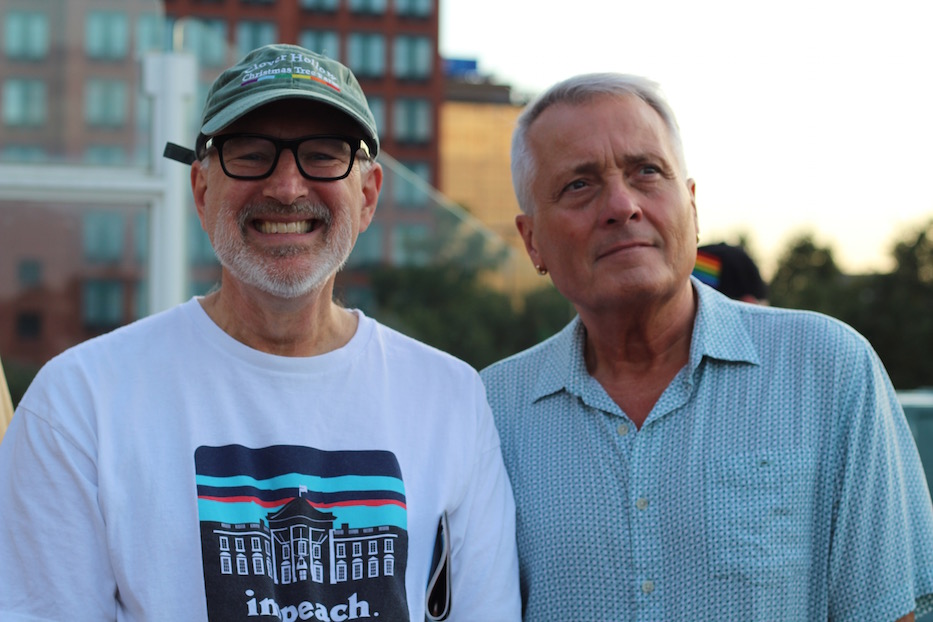
| New Haven Pride Center Co-Founder John Allen and his husband Keith Hyatte at a New Haven Pride kickoff in September 2019. The two went on their first date at The Pub in 1982. Lucy Gellman File Photo. |
But the 1990s were also bittersweet and often frightening. During his first years as owner, Goodwin found himself navigating the AIDS crisis in New Haven, at a time when the disease was largely stigmatized as a “gay cancer.”. Around him, people were disappearing. One week, he’d see a regular at the bar. The next week, they’d be gone.
Most customers had nicknames—Coyle was "Kitty;" another patron went by "Midnight Mary"—which meant there was no way to find them. According to the CDC, 78,000 people in the Northeast were diagnosed with AIDS between 1993 and 1995.
“We lost a lot of people,” he said. “The most disturbing part of that was the wondering. Everybody would be here, like, once a week. And then you don’t see them for the next week, the next week, the next week. And what you said to yourself was: Gee. Another one down.”
“You have to remember, you couldn’t contact anyone,” he continued. “Back in the 90s, these people weren’t out. You had a lot of people who were still married and had children. You had to protect your community. People would lose their insurance. They would lose their homes. They would lose their families.”
Goodwin recalled a single doctor who would do cash-only HIV testing, to prevent insurance companies from finding out about a patient’s diagnosis. Instead of using patient names, he would use code numbers. He remembered hearing the name over and over at the bar, as one friend referred another, and then another.
Even in the midst of crisis, Goodwin focused on giving back to the community. In the mid- 1990s, he started charging $1 at the door two days a week (with a laugh, he recalled the amount of grief some patrons gave him over the price). With the money he raised, he funded a local LGBTQ+ bowling league. Then he added a softball league. Then the Connecticut Gay Men’s Chorus, which performed at the bar once a week for two decades. In the late 1990s, the bar raised $15,000 for the then-nascent Oprah’s Angel Network, to go toward storm relief. Then it kept going.
In his first decade of business, Goodwin raised $250,000 for community groups. Each year, he still donates 100 percent of sales to A Place To Nourish Your Health (APNH, formerly AIDS Project New Haven) during its annual Dining Out for Life fundraiser. Two decades after sending his first check to the region’s gay bowling league, he makes sure he has enough money set aside to be a sponsor.
“One thing about the gay community is that when there’s something to be done, we’re there,” he said. “We are definitely there. When someone needs help, we’re there.”
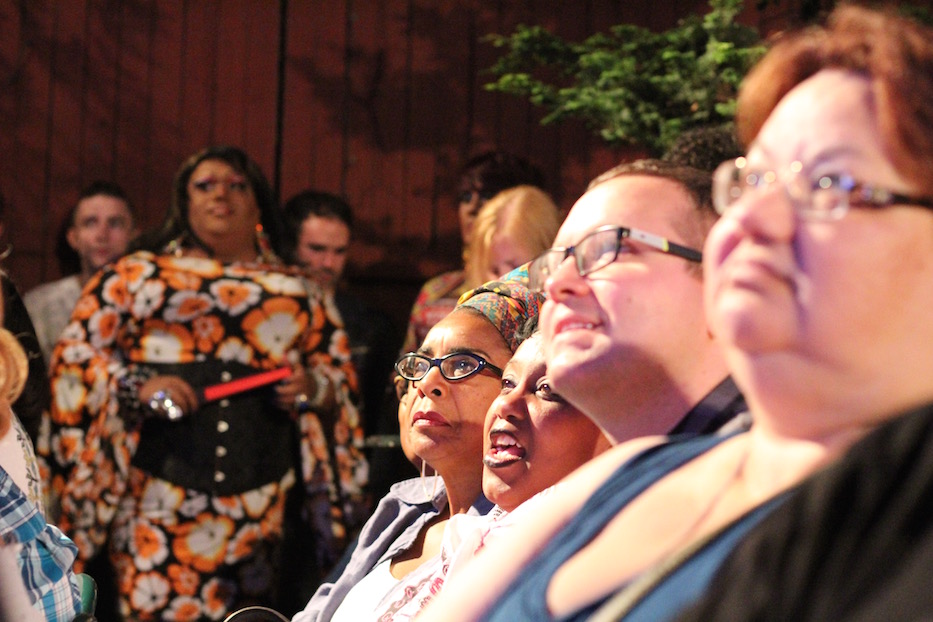
| Staff of the Stetson Branch library at Dragapalooza in 2018. Lucy Gellman File Photo. |
As time went by, he also watched gay bars become an endangered species. After almost three decades in business, Goodwin isn’t competing with fellow bars, so much as with the internet, dating apps, Netflix, and most recently a pandemic. Before COVID-19, the bar was still home to several weekly drag shows, fundraisers, well-loved Sunday brunches, and at least one musical about the dating app Grindr.
It was where first dates turned into long-term relationships, friends came back to reconnect after decades away from New Haven, and queens got their start. Robin Banks became a beloved community member during her monthly shows there. Kiki Lucia stepped into the spotlight and never left it. Goodwin still jumps at those opportunities. But he feels like the bar’s role as a lifeline is gone.
“We really sold ourselves out,” he said. “There’s an older generation and a younger generation. The older generation wanted to live on the down-low. They wanted their private clubs. You had a younger generation that wanted more freedom. The younger generation pushed for acceptance, and acceptance and acceptance.”
“This is where we are right now,” he continued. “They got accepted. Now meanwhile, my generation, we lost everything. We lost clubs that people died to come in. We set fashion. We set music. Everybody turned to the gay community back in the 80s and 90s. We paid a price to have acceptance. So now we don’t have the best bars anymore. We don’t have fashion. We don’t have music.”
Still, he said, he’s excited to be staying—this time as a tenant—for years to come. As he grabbed a chilled bottle of water from the bar last week, he joked that he won’t be the one replacing toilets when they break. Coyle has been ribbing him about the building, which he initially called a 10-year investment, for years.
In a phone call Monday, Allen and Hyatte echoed that enthusiasm. The two met at Partners in 1982, and have become fixtures in the city's LGBTQ+ history in the decades since. But Partners “was really a place to dance,” said Allen—they went for their first date at 168 York. Over matching chopped salads, they clicked. They’ve been together since.
In the decades that followed the 1980s, Allen said he's watched Yale buy up properties with a sense of anxiety. Even in the 1990s, the New Haven Pride Center couldn't afford to pay rent downtown, in a building owned by the university. He said he wonders how long independent, small businesses will be able to hold on as the university continues to expand.
"These things are so important," he said. "Pretty soon, Yale’s just going to own the entire city."
The news also came as a relief to Father Tom Jackson, who met his husband Alex there 20 years ago. Jackson, who is now the priest in charge at St. Luke's Episcopal Church, was almost 50 and working at the Regional Water Authority when 168 York changed his life.
In the 1980s and 1990s, Jackson worked as an environmental activist and reporter in New Haven. He was also closeted for the first four decades of his life, and had just started the coming out process in the 1990s. He went on to be one of the founding members of the New Haven Pride Center in 1996.
On the night he met his husband, "it was one of those cold New England winter nights." The windchill had dropped considerably. There was a full blue moon overhead; inches of snow on the ground glittered in its reflection as they crunched beneath his feet. He recalled watching his breath hang in the air as he rolled into the bar early, and waited for his date, who “just wanted to talk,” to arrive.
He went outside to look, and marveled at the wintry majesty even as he saw an empty street. He ducked outside a second time, and saw that no one had arrived at the bar. He went out a third time, and saw nothing. Then he turned around. Alexander Han—or as Jackson called him, simply Alex—was standing behind him.
The two were away from the city for 15 years, while Han pursued a law degree and Jackson went to divinity school on the West Coast. When they returned in 2019, they celebrated their anniversary with dinner at 168 York.
“It is a very special place and I’m hoping that other people will realize that and be able to enjoy the community bar,” he said. “Gay bars are an endangered species, and it’s part of our history. It’s part of our heritage and part of our community.”

